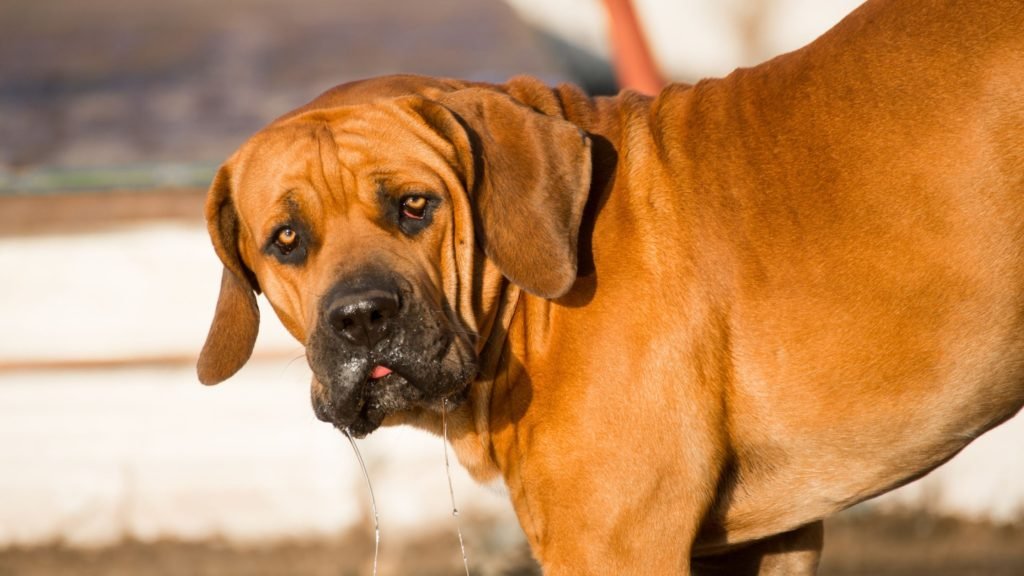Peek into the world of a Boerboel Dog – a breed where courage meets affection. Learn all about their history, lifestyle, and care.
Boerboel dogs are a fascinating breed with a long history dating back to the 17th century. Known for their impressive size, protective nature, and affectionate temperament, Boerboels make exceptional companions when properly trained and socialized. This article will thoroughly understand the Boerboel breed’s origin, characteristics, training needs, health issues, and more.
Boerboel Origin: A Breed with an Impressive History
The Boerboel dog, also known as the South African Mastiff, has roots in South Africa. The breed’s development involved crossing various local African breeds with those brought to South Africa by European settlers, including the Bullenbijter and different Mastiff types. These formidable dogs were bred to protect homesteads from predators, demonstrating their remarkable strength and resilience.
Early Roles of the Boerboel
During the early days, Boerboels served as all-purpose farm dogs. They were used in a wide range of tasks, such as:
- Hunting and tracking game
- Protecting livestock from predators
- Guarding their family’s property
Their versatility and reliability quickly made them a valued asset to any homestead.
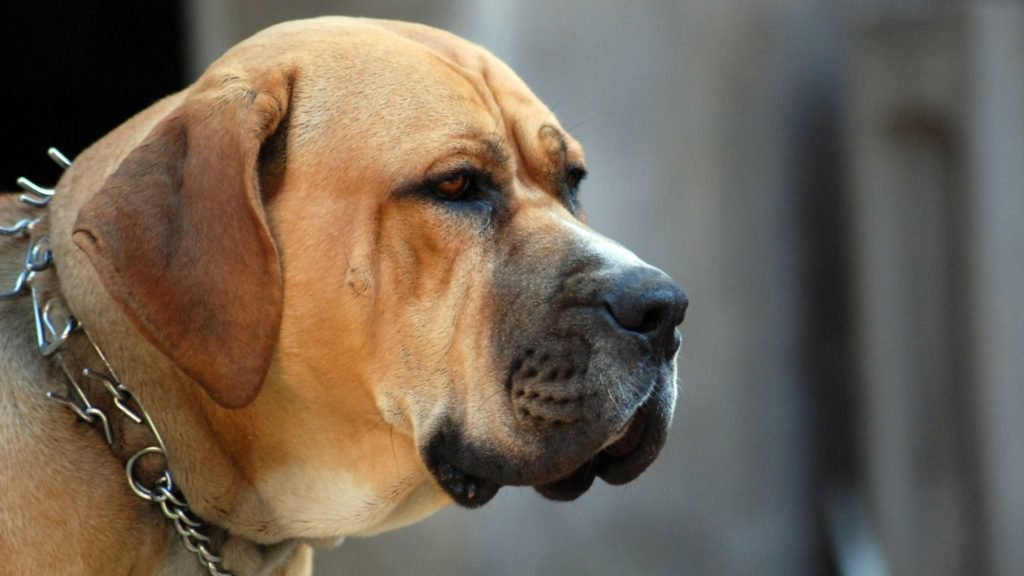
Boerboel Characteristics: What Makes Them Stand Out?
A Boerboel Dog Size and Weight
Boerboels are large, robust dogs, often standing between 22 to 27 inches at the shoulder for females and 24 to 28 inches for males. Their weight can vary from 110 to 200 pounds, with males typically larger than females. These dogs are muscular and well-proportioned, showcasing the power and agility necessary for their roles as protectors and farm dogs.
A Boerboel Dog Coat and Grooming
The Boerboel’s coat is short, dense, and smooth, coming in various colors such as fawn, red, brown, brindle, and black. They have moderate shedding and require regular brushing to keep their coat healthy and clean.
A Boerboel Dog Temperament: Are They a Good Fit for Your Family?
Understanding a Boerboel’s temperament is essential for any potential owner. Despite their imposing size, Boerboels are known for being affectionate and loyal to their families.
The Protective Boerboel
Their history as farm and guard dogs means that Boerboels have a strong protective instinct. They are naturally suspicious of strangers but can learn to be discerning and well-behaved around guests with proper socialization.
Boerboels and Families
Boerboels can be great family dogs, showing affection towards their family members. They are known to be particularly good with children, displaying a gentle and patient demeanor. However, their size makes supervision necessary when they are around small children.
Training a Boerboel Dog: Essential Tips for Success
Training your Boerboel dog is a critical part of owning this breed. Their intelligence and willingness to please make them highly trainable, but their stubborn streak and size make consistency and early training necessary.
Socialization is Key
For Boerboels, early socialization is crucial. As puppies, they should be exposed to various people, environments, and other animals to help them grow into well-adjusted adults. Well-socialized Boerboels are more confident and less likely to develop fear-based aggression or anxiety.
Positive Reinforcement Works Best
When training a Boerboel, positive reinforcement techniques are the most effective. Rewards-based training, which includes treats, praise, and toys, encourages good behavior. Due to their intelligence, they can quickly pick up new commands and tricks. However, keep sessions short and fun to prevent boredom.
Establish Leadership
Given their history as protector dogs, the owner must establish leadership early on. That doesn’t mean being harsh or dominant; it’s about setting clear boundaries and providing consistent training.

A Boerboel Dog Health Issues: What to Watch Out For
While Boerboels are generally healthy dogs, like all breeds, they are prone to certain health conditions. Understanding these can help ensure your Boerboel lives a long, healthy life.
Hip and Elbow Dysplasia
These are common conditions in large dog breeds, including the Boerboel. They occur when the joints develop abnormally, leading to arthritis and pain.
Heart Conditions
Boerboels are also prone to certain heart conditions, including dilated cardiomyopathy and aortic stenosis. Regular vet check-ups can help in early detection and treatment.
Caring for a Boerboel: Nurturing a Healthy and Happy Dog
Proper care goes a long way in ensuring your Boerboel is happy and healthy. That includes everything from diet and exercise to grooming and regular vet check-ups.
Diet and Nutrition
For big dog breeds like Boerboels, it’s usually best to feed them high-quality commercial dog food specially made for them. However, some owners prefer homemade or raw diets, so it’s important to seek advice from a veterinarian to ensure your Boerboel gets all the essential nutrients they need.
Exercise Needs
Boerboels are active and need regular exercise to keep them healthy and prevent boredom. That could be through walks, play sessions in the yard, or mentally stimulating games like fetch or tug-of-war.
Adopting A Boerboel Dog: What to Expect
Bringing a Boerboel into your home is a significant commitment. Whether you adopt from a rescue organization or buy from a reputable breeder, you should know a few things about the process.
Picking the Right Breeder
If you opt to buy a Boerboel puppy, ensure you choose a responsible breeder. Reputable breeders prioritize the health and temperament of their dogs above all else and can provide a history of the puppy’s parents and medical information.
Rescue and Adoption
Alternatively, adopting a Boerboel can be a rewarding experience. Rescue organizations often house dogs that need a second chance at a loving home. Remember that rescue dogs might require additional patience and training, but the reward is immeasurable.
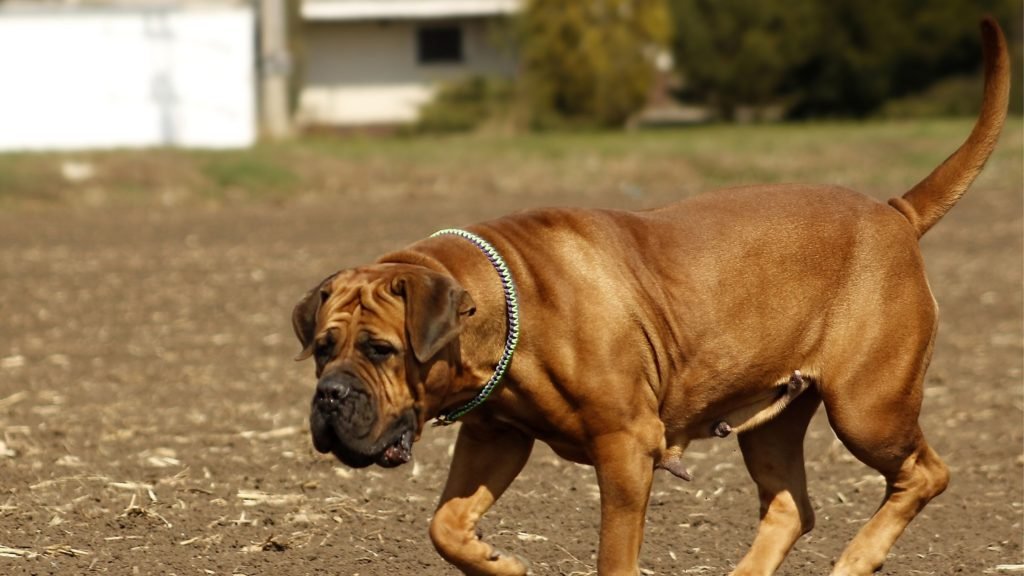
A Boerboel Dog Vs Other Mastiff Breeds: A Comparison
Like other mastiff breeds, Boerboels are large, strong, and protective. However, they do have unique characteristics that set them apart.
Temperament Differences
While all mastiffs are protective, a Boerboels dog are particularly known for their loyalty to their families. They are also more active than other mastiff breeds, requiring plenty of exercises to stay happy and healthy.
Size and Appearance
Boerboels are muscular, robust, and remarkably agile compared to other mastiff breeds. This unique trait makes them exceptional working dogs and formidable protectors.
Boerboel's Interaction with Children and Other Pets
The Boerboel can coexist peacefully with children and other pets when well-socialized. These dogs have a protective nature, making them great companions for children. However, because of their size, Boerboels should always be supervised around small children to ensure everyone’s safety.
Establishing Boundaries
Teaching children how to interact respectfully with the dog is crucial, as Boerboels will not tolerate rough handling. Establishing boundaries for your children and dog can lead to a harmonious relationship.
Interaction with Other Pets
Boerboels can coexist with other pets if properly introduced and socialized from a young age. However, their dominant nature can lead to conflicts with other dogs, especially those of the same sex.
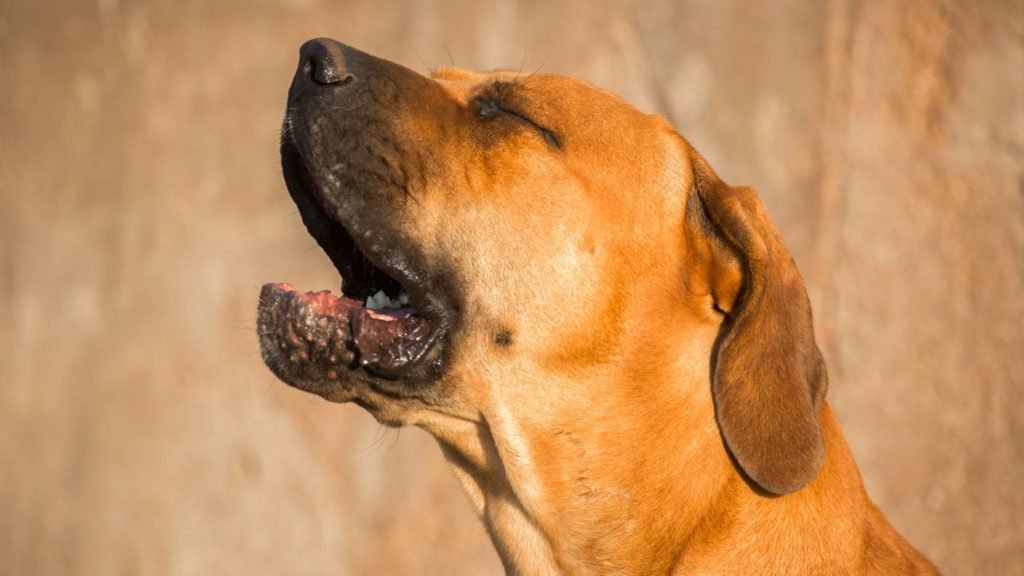
Training Tips for a Boerboel Dog
Boerboels are intelligent, quick learners that respond well to firm, fair, and consistent training methods. However, their strong-willed nature can pose challenges if not properly guided.
Start Training Early
Early socialization and obedience training are crucial for Boerboels. Start teaching them basic commands when they are comfortable in their new home. Puppy training classes can be a great resource to kickstart their learning process.
Positive Reinforcement
Use positive reinforcement techniques such as treats, praise, and play. Boerboels respond well to these methods. Remember, harsh punishment can lead to fear, aggression, or stubbornness.
Consistency is Key
Be consistent with your commands and rules. If you let your Boerboel get away with undesirable behavior even once, they might think it’s okay to repeat it.
Challenge their Minds!
Since Boerboels are intelligent dogs, they need mental stimulation as much as physical. Incorporate puzzle toys, advanced obedience, and agility training to keep their minds sharp.
Conclusion
Understanding the Boerboel’s characteristics, needs, and behaviors can prepare potential owners for what to expect when bringing this beautiful and powerful breed into their homes. With love, care, and the right training, a Boerboel can make a wonderful addition to the right household.
Frequently Asked Questions about Boerboels
Is a Boerboel Right for Me?
A Boerboel can be a wonderful addition to families who can meet their exercise, training, and socialization needs. They are best suited to those with experience with large, assertive breeds.
Are Boerboels Good Family Dogs?
Yes, Boerboels are known to be loyal, protective, and affectionate with their families. However, their size and energy level require careful consideration, especially around small children and other pets.
What are the Living Conditions for Boerboel Dogs?
Boerboels are versatile and can adapt to different living conditions but need plenty of space to move around. A house with a large, secure yard is ideal.
Related Articles
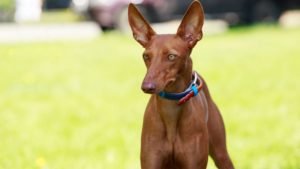
Pharaoh Hound Egyptian Dogs: An In-depth Look
If you’ve ever felt intrigued by the

Azawakh vs Greyhound: Which Breed Reigns Supreme?
If you’re a dog lover who’s torn

How Much Does an Affenpinscher Cost? Breaking Down the Budget
You’ve seen an Affenpinscher and fallen in

Discover the unique world of wolf dogs breeds: Top 9 Breeds
Wolf dogs breeds, also known as wolf

From Shiba Inu to Akita: The Best Japanese Dogs Breeds You Need to Know
Japanese dogs breeds have evolved over millennia

10 foods dogs should not eat: Don’t put in risk your dog’s health
10 Foods Dogs Should Not Eat: Discover

